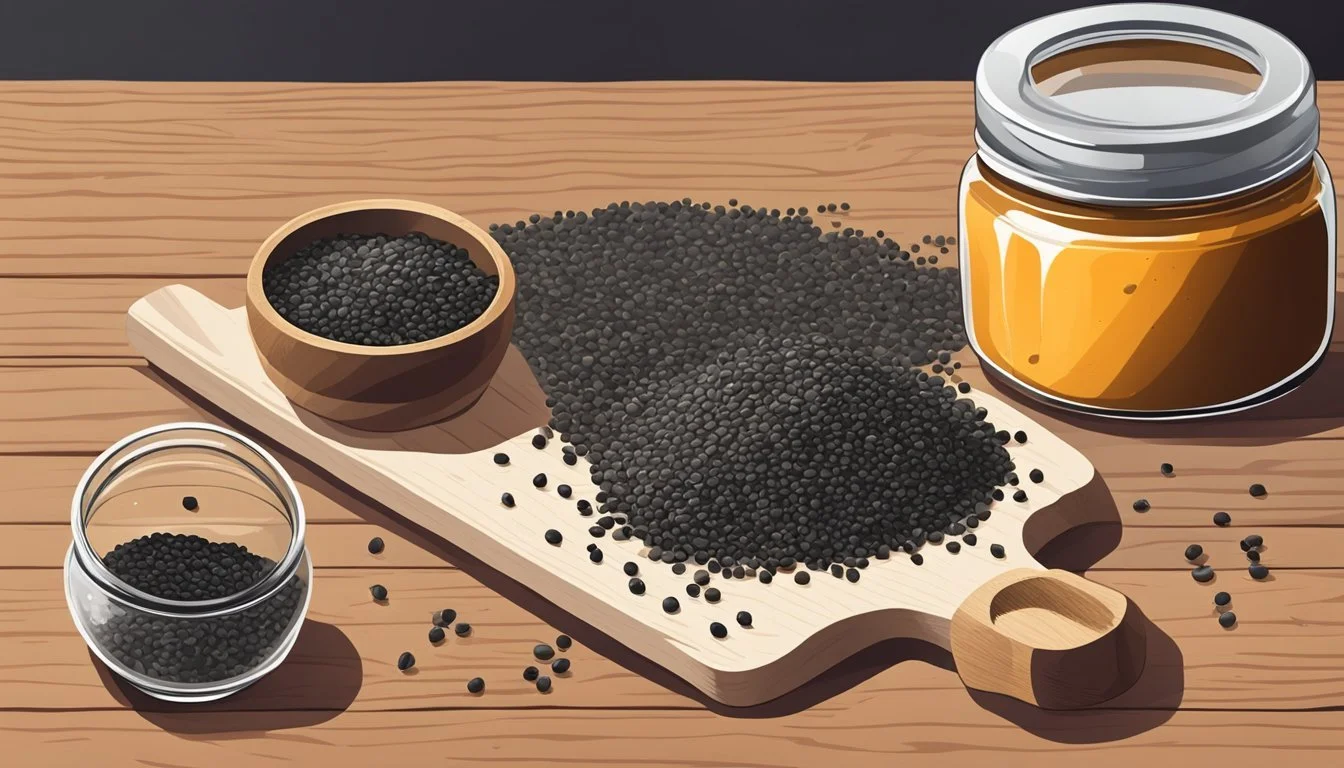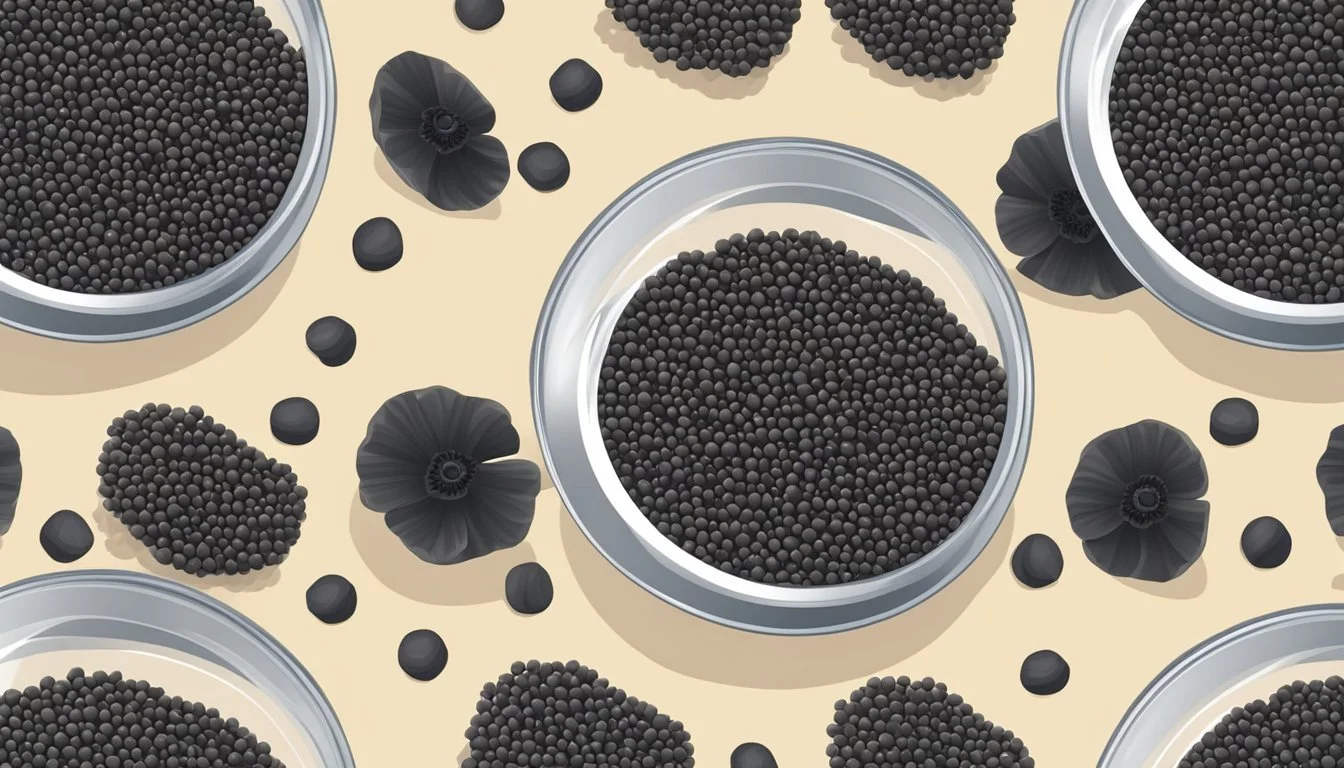Does Poppy Seeds Go Bad?
Shelf Life and Storage Tips
Poppy seeds are a common ingredient in many kitchens, known for their nutty flavor and versatility in culinary applications. Poppy seeds can last for several years if stored properly, but they will eventually go bad. Proper storage involves keeping them in a tightly sealed container and placing them in a cool, dry place, ideally in the refrigerator.
Signs that poppy seeds have gone bad include a dull color, musty or moldy smell, and a shrunken or shriveled appearance. Regular checks on the quality of stored poppy seeds are essential to ensure that they retain their freshness and potency.
Understanding how to store these seeds correctly and recognize spoilage signs can help in making the most of their shelf life. Readers who frequently use poppy seeds in their recipes can benefit significantly from these insights.
Understanding Poppy Seeds
Poppy seeds, derived from the opium poppy plant, are small, kidney-shaped seeds used in various culinary dishes.
They come in several varieties, the most common being white poppy seeds and blue poppy seeds.
These seeds are prized for their nutty flavor and crunch, making them a popular addition to baked goods and salads.
Poppy seeds offer several health benefits. They are rich in nutrients such as calcium, iron, and magnesium.
Additionally, they contain essential fatty acids, which contribute to heart health. Their high fiber content also aids in digestion.
Despite their connection to the opium poppy, poppy seeds do not contain significant amounts of opiates.
They undergo rigorous cleaning processes to ensure safety for consumption.
Culinary uses of poppy seeds are vast and varied. They can be used as a topping for breads and pastries, incorporated into salad dressings, or even ground into sauces.
To maintain their flavor and nutrition, it’s best to store poppy seeds in an airtight container in a cool, dry place, away from direct sunlight.
Refrigeration extends their shelf life, preserving their nutty taste and nutritional value for longer periods.
Proper Storage Essentials
Maintaining the quality of poppy seeds over time depends heavily on specific storage conditions. Key factors include keeping them dry, regulating temperature and light, and using appropriate containers.
The Importance of Dry Conditions
Poppy seeds must be kept dry to prevent spoilage. Moisture is a seed's worst enemy, promoting mold and bacterial growth. To ensure they stay dry, store them in a location with low humidity.
Humidity Control Tips:
Store in a dry place like a pantry or cupboard.
Use silica gel packets in containers to absorb excess moisture.
Avoid places near sinks or stoves where steam and moisture are prevalent.
Even a small amount of moisture can degrade the quality, making a dry environment paramount.
Temperature and Light Factors
Temperature and light exposure also play critical roles. High temperatures and direct sunlight can cause oils in poppy seeds to become rancid.
Temperature and Light Guidelines:
Keep seeds in a cool and dark place.
Avoid places like over the stove or near windows.
Use opaque containers to block light.
Refrigerator and Freezer Storage:
Storing in the refrigerator or freezer can extend the shelf life.
Ensure the seeds are in airtight containers to prevent condensation.
Proper regulation of these factors significantly extends freshness and quality.
Containers and Locations
Choosing the right containers and storage locations is essential for maintaining quality. Airtight containers are crucial to protect poppy seeds from air, moisture, and pests.
Container Recommendations:
Glass jars with tight lids.
Vacuum-sealed bags.
Plastic containers with seals.
Best Locations:
A cool pantry away from heat sources.
Dark cupboards that do not receive direct sunlight.
For long-term storage, consider the freezer, ensuring proper sealing to avoid freezer burn.
Using the right containers and storage spots not only preserves the seeds but also retains their flavor and nutritional value. Proper care can keep poppy seeds fresh for years, maintaining their utility and taste for various culinary uses.
Shelf Life and Signs of Spoilage
Poppy seeds can have a long shelf life if kept under ideal conditions, but certain signs can indicate when they have gone bad. Knowing how to store them correctly and identifying spoilage can ensure they remain fresh for a longer period.
Determining Shelf Life
Unopened packages of poppy seeds typically last up to several years. Once opened, they should be stored in the refrigerator or a cool, dry place in airtight containers to extend their freshness.
Storing poppy seeds in a tightly sealed container or jar and placing them in the refrigerator can significantly prolong their shelf life. Fresher, less-processed seeds tend to last longer compared to older or more processed ones.
Indicators of Deterioration
Poppy seeds display certain signs when they spoil. A rancid or off odor is one of the first indicators that the seeds have gone bad.
Discoloration or a musty or moldy smell are also clear indicators of spoilage. Visibly, spoiled poppy seeds may appear shriveled, shrunken, or moldy. A dull color compared to fresh seeds suggests they are no longer viable, and their taste will also be noticeably off.
Incorporating Poppy Seeds in Cuisine
Poppy seeds bring a nutty flavor and versatility to many dishes. This section explores recipes, optimal usage, and traditional culinary practices employing poppy seeds.
Recipes and Hand-Selected Dishes
Recipes featuring poppy seeds are diverse and cater to various tastes. In baking, they enhance the flavors of bagels, breads, and muffins. For dessert lovers, cakes and sweet pastries benefit greatly from their addition. They provide a unique crunch and flavor.
In savory dishes, poppy seeds can be ground and added to curries for a rich texture. Roasted vegetables and salads benefit from the seeds sprinkled on top or mixed into dressings for a nutty zest.
Optimal Use and Handling
To maintain the freshness and potency of poppy seeds, they should be stored in airtight containers. Placement in a cool, dark, and dry location is essential. Storing them in the refrigerator can extend their freshness further.
Poppy seeds can be used whole or ground, each form offering different culinary benefits. Grinding the seeds can intensify their flavor and ease their incorporation into recipes like garam masala or curry powders.
Cultural Culinary Traditions
Poppy seeds feature prominently in various cultural cuisines. In Indian cuisine, they are often blended with spices like garam masala and used in curries. Middle Eastern cuisine frequently uses them in pastries and breads, contributing distinct texture and taste.
In some traditions, poppy seeds are integral in special dishes during festivals. Dishes encompassing poppy seeds highlight not only the seed's flavor but also its cultural significance. These seeds are versatile and cherished components of recipes spanning the globe.
Health Benefits and Considerations
Poppy seeds are rich in nutrients that can offer several health benefits. They contain significant amounts of dietary fiber, which supports digestion and helps prevent constipation.
These seeds are also packed with antioxidants, such as flavonoids and phenolic compounds, which can help protect the body from oxidative stress.
Heart health can benefit from the presence of healthy fats in poppy seeds, including omega-3 fatty acids. These fats are essential for maintaining a healthy heart and brain function.
Additionally, poppy seeds provide minerals like calcium and magnesium, which are crucial for bone health and blood clotting.
Nutrient Amount per 1 tsp (9g) Calories 14.7 kcal Fat 1.2 g Fiber High Calcium 35% DV in 3 tbsp
Considerations should be made regarding poppy seeds and their opiate content. While negligible, the seeds can sometimes contain traces of opiates due to the process of harvesting.
However, it is important to note that typical culinary use of poppy seeds is generally considered safe and should not cause any psychoactive effects.
Poppy seeds can be a beneficial addition to a balanced diet, offering an array of nutrients that support various aspects of health.
Maintaining Freshness and Quality
Proper storage techniques can significantly extend the shelf life of poppy seeds, ensuring they retain their flavor and potency. The following methods can help maximize freshness and quality, while preventing contamination.
Maximizing Seed Longevity
To maintain the freshness and quality of poppy seeds, they should be stored in a cool, dry place, away from direct sunlight. Temperature fluctuations can negatively impact the seeds' potency.
Unopened packages are best kept at room temperature, where they can remain fresh for several years. Once the package is opened, transfer the seeds to an airtight container to protect them from moisture and air exposure. Storing opened seeds in the refrigerator can further prolong their shelf life.
Consider using labeling to mark the date of purchase, which helps in tracking freshness. For best results, always choose high-quality seeds at the time of purchase.
Preventing Contamination
Preventing contamination is crucial for maintaining the quality of poppy seeds. Ensure that containers are clean and dry before filling them with seeds. Avoid using lids or jars that have been in contact with other foods to prevent cross-contamination.
Store the seeds away from strong-smelling items, as they can absorb odors, affecting their flavor. It's also important to use clean utensils when scooping out seeds to minimize the risk of introducing contaminants.
Check the seeds periodically for signs of spoilage, such as a musty odor or a shriveled appearance. Dispose of any seeds that show these signs to prevent potential health risks.






